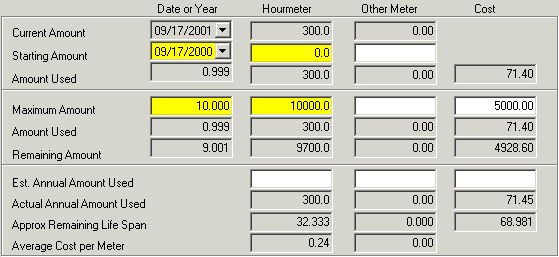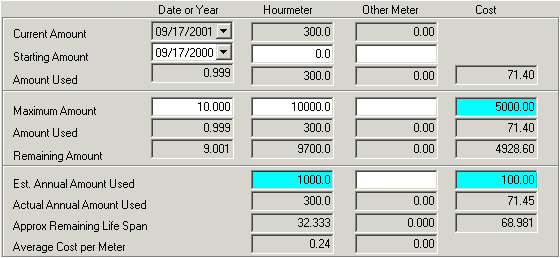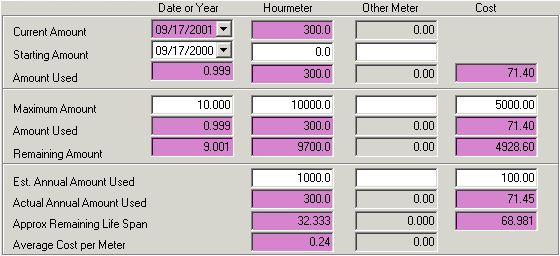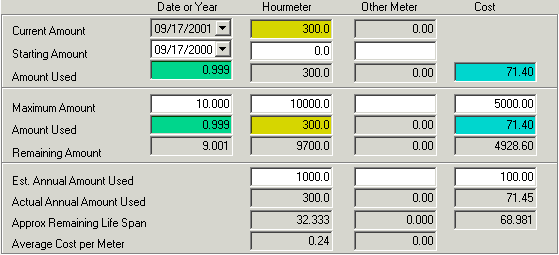
The Evaluation (Eval) tab is the most comprehensive attribute in the Equipment Inventory module. It allows you to estimate the running cost of the equipment and assess the life span of the equipment based on running costs and recorded usage. Some of the fields in the Eval tab are entered by the user (these fields appear in white in the module). Other fields are calculated automatically by the system (these fields will be grayed out in the module).
To start using the Eval tab, you must enter values in the following fields. These user-entered fields are highlighted in yellow below.
Note: The Current Amount fields are updated each night as well as upon save or refresh of the Equipment record. The data in these fields comes from the Readings records or Work Orders. If either of these records are created with a more recent meter reading, the data in these fields will be overwritten.
Note: The Current Amount fields will be updated by a Work Order only if a meter reading has been populated in the Work Order Assets grid and the Work Order End Date on the WO tab is greater than the current date in this record.

Current Amount |
|
Note: These fields are filled in by the system. They will be updated each night as well as upon save or refresh of an Equipment record. |
|
Date or Year |
The last date that any work or fueling was recorded for the equipment |
Hourmeter or Other Meter |
The most recent meter reading. This can come from an inspection record, readings record, or a work order. |
Starting Amount |
|
Date or Year |
The date the equipment went into service. |
Hourmeter or Other Meter |
The meter reading when the equipment went into service. |
Maximum Amount |
|
Date or Year |
The number of years the equipment is expected to be in service. |
Hourmeter or Other Meter |
The anticipated maximum meter reading for the equipment. |
Additionally, if you want the estimated life span of the equipment or the estimated cost of running it, you need to enter values in the Estimated Annual Amount Used and Cost Information fields. These fields are highlighted in blue below.

Maximum Amount |
|
Cost |
The maximum amount of money available to spend on equipment repairs and preventative maintenance during the equipment's life span. |
Est. Annual Amount Used |
|
Hourmeter or Other Meter |
The estimated annual meter reading for the equipment. |
Cost |
The estimated annual expenses for the equipment. |
Once you have entered values for the fields mentioned above and saved the record, the system calculates values for the remaining fields. These calculated fields are highlighted in pink below.

Current Amount |
|
Note: These fields will be updated by the system. Refer to the top of the screen for additional details. |
|
Date or Year |
The last date that any work or readings were recorded for the equipment. |
Hourmeter or Other Meter |
The most recent meter reading. This can come from a readings record or a work order. |
Amount Used |
|
Date or Year Note: This field is used twice in the grid. |
The number of years the equipment has been in service based on the difference between the starting amount date and the current amount date. |
Hourmeter or Other Meter |
The number of hours the equipment has been used since being put into service. This value is based on the difference between the starting amount meter reading and the current amount meter reading. |
Cost Note: This field is used twice in the grid. |
The total cost spend on the equipment to date. This includes work order costs and any additional costs listed in the costs grid on the Cost tab. |
Remaining Amount |
|
Date or Year |
The estimated number of years left in the equipment's life span. |
Hourmeter or Other Meter |
The estimated available working hours left in the equipment's life span. |
Cost |
The amount left in the budget for equipment repairs and maintenance. This is based on the difference between the maximum amount cost and the actual amount spent. |
Some of the fields in the grid will present duplicate information. Duplicate fields are listed below. Each field is color-coded to match its counterpart.
